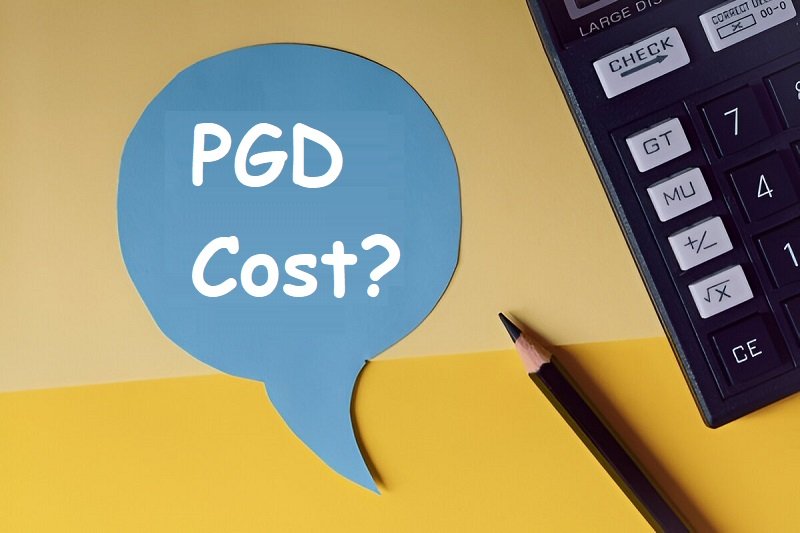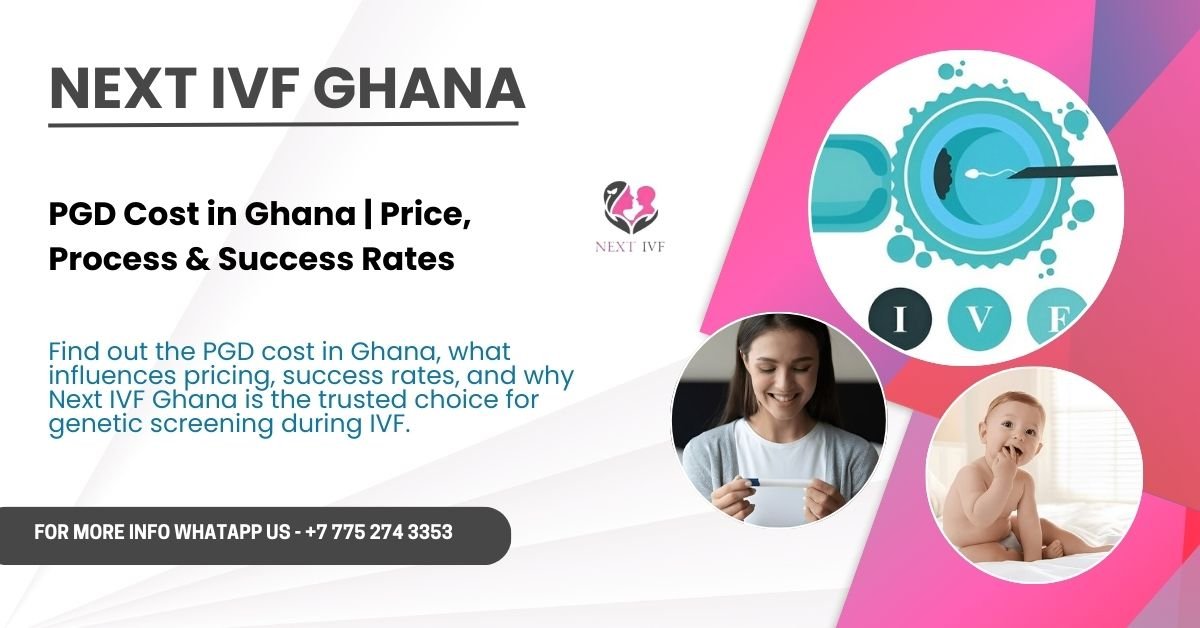PGD Cost in Ghana
Every parent dreams of giving birth to a healthy child. But for some couples, especially those with a history of genetic disorders or repeated IVF failures, the journey can be more complicated. Preimplantation Genetic Diagnosis, or PGD, brings new hope to these families by allowing them to screen embryos for genetic conditions before pregnancy begins. In Ghana, this advanced fertility option is becoming increasingly available, offering couples not only the chance to conceive but also to reduce the risk of inherited diseases.
PGD is often used alongside IVF and can help avoid passing on serious conditions like sickle cell anemia, thalassemia, cystic fibrosis, and more. Ghana, being one of the countries in Africa most affected by genetic blood disorders, especially benefits from the availability of PGD services. Clinics are now equipped with the latest technology to screen embryos, ensuring only the healthiest ones are selected for transfer.
This article will guide you through what PGD really is, how it works, its PGD Cost in Ghana, success rates, and what factors affect the outcome. Whether you’re a couple trying to prevent a genetic condition or someone with repeated IVF failures, PGD in Ghana may be the path you’ve been searching for. Let’s explore it together in a friendly, easy-to-understand way.
What is PGD?
PGD, or Preimplantation Genetic Diagnosis, is a medical procedure used during IVF to screen embryos for specific genetic diseases or chromosomal abnormalities before they are transferred to the uterus. The goal of PGD is to help couples avoid passing on inherited conditions to their children and to increase the chances of a healthy pregnancy.
PGD is usually recommended for couples who are known carriers of genetic diseases, have experienced multiple miscarriages, have had a previous child with a genetic condition, or are undergoing IVF due to unexplained infertility. The process begins with standard IVF, where eggs are retrieved from the woman, fertilized with the partner’s sperm, and allowed to develop into embryos.
On day 5 or 6 of embryo development (blastocyst stage), a few cells are gently removed from each embryo for genetic testing. These cells are then analyzed in a lab to check for specific genetic issues. Only healthy, unaffected embryos are selected for transfer into the uterus.
PGD can help detect conditions such as cystic fibrosis, Tay-Sachs disease, sickle cell anemia, and other single-gene disorders. It also helps avoid embryos with abnormal numbers of chromosomes, which could lead to miscarriage or birth defects.
In Ghana, PGD is now available in several advanced fertility clinics, offering couples a safer, more informed IVF experience. This process not only improves the chances of a successful pregnancy but also provides peace of mind for couples worried about genetic risks.
Why Do People Choose PGD?
1. To Prevent Genetic Disorders
Couples who are carriers of inherited diseases like sickle cell anemia, thalassemia, or cystic fibrosis choose PGD to avoid passing the condition to their child. PGD allows them to select only healthy embryos for transfer, significantly reducing the risk of giving birth to a child with a serious genetic illness.
2. Recurrent IVF Failures
PGD helps improve IVF success rates by screening out embryos with chromosomal abnormalities that are unlikely to implant or may result in miscarriage. This gives couples a better chance of achieving a healthy pregnancy in fewer IVF cycles.
3. Repeated Miscarriages
If a couple has had multiple miscarriages due to chromosomal issues, PGD can be used to identify embryos with the correct number of chromosomes, reducing the risk of another loss and increasing the likelihood of a full-term pregnancy.
4. Advanced Maternal Age
As women age, the risk of chromosomal abnormalities in embryos increases. PGD helps select chromosomally normal embryos, which improves the success rate and reduces the risk of having a child with conditions like Down syndrome.
5. Family Balancing (in some cases)
In rare cases where it’s legally allowed, PGD can be used for non-medical reasons such as family balancing, choosing a child of a specific gender. However, this is usually tightly regulated and not the primary use of PGD in Ghana.
PGD Cost in Ghana

PGD in Ghana is a specialised and advanced service, so its cost is generally higher than standard IVF. The total cost includes IVF procedures, embryo biopsy, genetic testing, and lab work. However, it is still significantly more affordable than similar treatments in countries like the US or UK.
While the price may seem high at first, it is important to understand that PGD offers long-term benefits, including the peace of mind that comes from knowing your child will not inherit a serious genetic disorder. Many clinics in Ghana offer payment plans or package deals for couples undergoing IVF with PGD.
1. IVF Base Cost
You must do IVF first, which costs around GHS 30,000 to 40,000 in Ghana.
2. PGD Testing Charges
Genetic testing of embryos costs about GHS 20,000 to 25,000, depending on the clinic.
3. IVF + PGD Package
Some clinics offer both IVF and PGD together in a package for GHS 50,000 to 65,000.
4. Fertility Medication
Hormone injections and medicines cost GHS 7,000 to 12,000 during the IVF process.
5. Embryo Freezing Cost
Freezing extra healthy embryos for future use costs GHS 5,000 to 7,000 per year.
6. Genetic Counseling
Optional counseling sessions to understand PGD results cost about GHS 1,000 to 2,000 extra.
Factors That Affect PGD Cost in Ghana
1. Number of Embryos Tested
The more embryos you test, the higher the PGD cost will be. Each embryo batch is tested separately in a lab using advanced genetic techniques, and charges increase with the number of samples processed.
2. IVF Cycle Type
A fresh IVF cycle is more expensive than a frozen embryo transfer. If PGD is done on previously frozen embryos, the cost might be lower, but success rates can vary depending on embryo quality.
3. Clinic Location and Reputation
Clinics in major cities like Accra may charge higher fees due to advanced infrastructure and experienced specialists. However, they often have higher success rates and better facilities, which can be worth the cost.
4. Type of Genetic Testing Used
The cost also depends on whether you’re testing for single-gene disorders or doing comprehensive chromosomal screening. Advanced testing techniques like NGS (Next Generation Sequencing) are more accurate but also more expensive.
5. Medication Requirements
The cost of hormonal stimulation and other IVF medications can vary depending on the woman’s response and body type. Some women may need higher doses, leading to increased expenses.
PGD Success Rate in Ghana

The success rate of PGD in Ghana has steadily improved with advancements in fertility treatments and laboratory techniques. The effectiveness of PGD largely depends on the quality of the IVF process, the genetic lab’s accuracy, and the age and health of the patient. Most well-established clinics in Ghana now report success rates between 60% and 70% for PGD-assisted IVF cycles, especially in younger women.
When PGD is used, only genetically healthy embryos are transferred, which increases the chance of implantation and reduces the likelihood of miscarriage or genetic disorders. Couples with a known history of genetic issues often experience great relief knowing they are choosing the safest possible path to parenthood.
For women under 35, PGD combined with IVF can result in success rates of up to 70%. However, the rate may be lower for women above 40 due to decreased egg quality. That said, the use of donor eggs along with PGD can still produce highly successful results.
It’s important to remember that success is not just measured by pregnancy, but by delivering a healthy baby. PGD increases the chances of a healthy pregnancy and reduces emotional stress associated with uncertainty.
Clinics offering PGD in Ghana often provide counseling and personal support, helping couples prepare mentally and emotionally. As awareness and demand grow, more fertility centers in Ghana are investing in better equipment and training, making PGD a safer, more accessible option for many families.
When Should You Consider PGD?
1. You Are a Carrier of a Genetic Condition
If either partner carries a gene for a hereditary disease like sickle cell anemia, PGD is recommended to prevent the child from inheriting that condition. It’s especially important if both partners are carriers.
2. History of Genetic Disorders in Family
If you have a child or close family member with a serious genetic condition, PGD helps avoid recurrence and ensures future children are not affected.
3. Age Over 35 with IVF
Women above 35 are at higher risk of having embryos with chromosomal abnormalities. PGD can help select genetically normal embryos, boosting chances of success.
4. Multiple IVF Failures or Miscarriages
Couples with a history of failed IVF attempts or miscarriages often turn to PGD to rule out hidden genetic problems and improve their outcomes.
5. Male Factor Infertility with Chromosomal Issues
In some cases, male infertility is linked to chromosomal defects. PGD helps check embryo health before transfer, increasing chances of a successful pregnancy.
Why Trust Next IVF Ghana?

Dealing with infertility can be one of the toughest challenges in life, emotionally and physically. But you don’t have to face it alone. At Next IVF Georgia, we blend the latest medical technology with genuine care and understanding to help you fulfill your dream of becoming parents.
Our center is committed to offering personalised fertility treatments designed just for you. We know how important starting or growing your family is, and our team, including IVF specialists, gynaecologists, embryologists, and caring support staff, is here to guide you at every step.
Why choose Next IVF Ghana as your fertility partner?
- Comprehensive treatments: From IVF, IUI, frozen embryo transfer to egg and sperm donation, laparoscopy, ICSI, PGD, and male infertility treatments, we cover it all with advanced methods.
- High success rates: Our experienced doctors and proven protocols increase your chances of success.
- Affordable care: We believe quality fertility treatment should be available to everyone, so we offer top-notch care at prices that won’t break the bank.
Don’t wait any longer to start your journey to parenthood. Reach out to Next IVF Dubai today at +91 7827636596 or email us at info@nextivf.com. Together, we’ll turn your hope into a happy family, with the right center, expert doctors, and heartfelt care.
Conclusion
For couples facing genetic risks or multiple failed IVF attempts, PGD is more than just a medical test, it is a ray of hope. It brings the comfort of knowing that you’ve done everything possible to ensure your child is free from inherited illness. In Ghana, the growing availability of PGD services is a major step forward in reproductive medicine.
The process of PGD may seem complex at first, but when paired with IVF and performed by experienced professionals, it offers life-changing results. Couples who once feared having a child with a serious health condition are now welcoming healthy babies into their lives, all thanks to this breakthrough in fertility care.
Yes, the PGD Cost in Ghana is higher than regular IVF, but the benefits often outweigh the financial burden, especially when you consider the emotional and physical impact of repeated miscarriages or caring for a child with a lifelong illness. Many clinics in Ghana also offer personalized counseling and flexible payment options to ease the process.
As Ghana continues to grow in the field of assisted reproduction, PGD stands out as a symbol of progress and compassion. Whether you’re a couple in Ghana or from a neighboring country, seeking PGD here could be the first step toward the healthy family you’ve always dreamed of.
FAQs (Frequently Asked Questions)
1. Is PGD available in all IVF clinics in Ghana?
No, PGD is only offered at select advanced fertility centers with in-house genetic labs or partner labs.
2. How much does PGD cost in Ghana?
The cost ranges between GHS 50,000 to 65,000 for IVF plus PGD, depending on the clinic and type of genetic testing required.
3. Is PGD painful?
No, PGD itself is not painful. The embryo biopsy is done in the lab and does not affect the patient directly. IVF may involve minor discomfort during egg retrieval.
4. Can PGD guarantee a healthy baby?
PGD greatly reduces the risk of genetic disorders but cannot guarantee complete health, as some conditions develop after birth due to the environment or unknown factors.
5. How long does PGD take?
The PGD process adds about 5 to 7 days to the IVF cycle, as time is needed to analyze embryo cells in the lab.
6. Is PGD safe for the embryo?
Yes, when done by experienced professionals, PGD is considered safe and does not harm the embryo’s development or future health.
Read Also:

